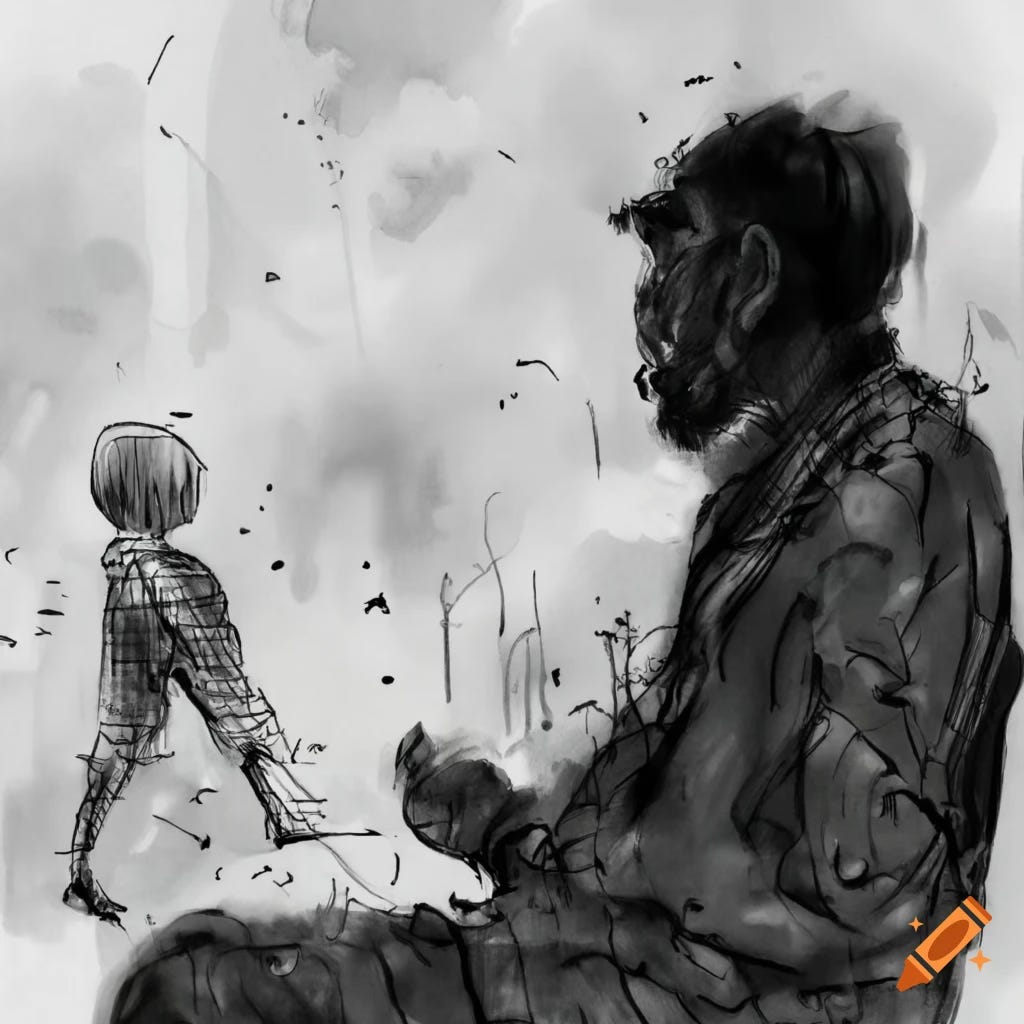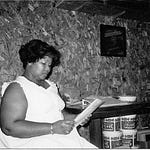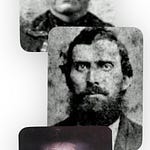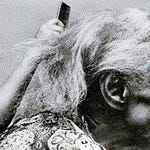I was about six years old, sitting under a mimosa tree in our backyard, trying to escape the oppressive Mississippi afternoon sun. Nearby, an older Black man was raking straw. As I watched him work, I noticed he was wearing a flannel shirt, even in the stifling summer heat. My curiosity got the better of me, so I approached him.
“Why are you wearing that hot shirt?” I asked. “Ain’t you burnin’ up?”
He looked down at me and smiled. He explained that the shirt made him sweat, and when a breeze came up, it cooled his skin.
I smiled back, considering the wisdom of his reply. Just then, the older white woman whose yard we were in stepped out of her back door and walked over to us.
Her name was Helen Callahan. I called her "Miss" Helen not because she was unmarried, which she wasn't, but because in the South, older white women were not addressed using Mrs. or their last names. When they advanced past some unspoken age, even if they were 80 and on their ninth marriage, you just knew to address them using Miss and their given name. It's part of the complex nomenclature of titling in the South.
Miss Helen was typical of older Southern women in that society charged her with shaping every rough-edge boy within her purview into a bona fide Southern gentleman. So besides teaching me various titles of respect, she told me always to say "yes, sir" and "no, ma'am," never to talk with my mouth full, and to keep my elbows off the table. I loved Miss Helen dearly. She was one of the sweetest, gentlest, and most refined women I have ever encountered. To make her proud was my most noble ambition.
When she joined us, she asked sweetly, "What y’all doing out here?"
Eager to impress her with my manners, I answered, "I’m just talking to Mister Joe."
Miss Helen’s expression changed. Her brows knitted, and her lips pursed in a way that I knew I had said something “unmannerly.”
“Oh, no, Johnny,” she corrected kindly. “Joe’s not a mister. Joe’s a n----r.”
I looked up at Miss Helen, who was smiling sweetly at Joe. Her words hadn’t been harsh, nor her tone hostile. There was no hint of malice in what she said, only what she believed to be the Christian truth. It was clear she cared for Joe.
“One day, Joe will call you mister,” she continued, “but never the other way around.”
She turned to Joe. “It’s so hot today, Joe. Would you like me to bring you a glass of ice water?”
I looked at Joe next. He was also smiling pleasantly, nodding his head in agreement. That settled it for me. This was the way things were supposed to be, I thought, and everyone seemed fine with it. At that moment, the world split in two—me on one side, Joe on the other. He was no longer Mister Joe in my eyes; he was Miss Helen’s yard boy, someone different, someone less.
Suddenly, so much of my young world made sense. I understood why there were certain water fountains I wasn’t supposed to drink from, why Black people had to eat their food from the café in the alley, and why the shacks in “colored town” had no paint and the roads no pavement. It all made perfect sense now. I understood that it was about the color of our skin—Joe’s color was “less,” and mine was “more.”
I also learned that Black people weren’t supposed to look whites in the eye. I saw my mother get upset one day at Jackson’s Grocery when a Black woman had the audacity to talk to her woman-to-woman without lowering her gaze. I believed this was just the way things were, the way Black people were supposed to show respect to us white folks.
But now, I wonder if it wasn’t also about the danger of humanizing “the other.” When you look someone in the eye long enough, it’s impossible to see just a maid, a yard boy, or “one of those people.” You see a father, a mother, a child, or a kind man raking straw—an individual. Continually being reminded of their humanity would make it difficult to sustain such an oppressive system as Jim Crow.
I once heard someone say, “Perception is a clash of mind and eye, the eye believing what it sees, the mind seeing what it believes.” In truth, when it came to race, a curtain closed between Joe’s humanity and mine. I lulled myself into comfortable unconsciousness, seeing only what I believed. It would be years before I realized that when I dismissed Joe’s story, I was also dismissing a critical part of my own.
Fast forward thirty years. I’m 37, five years sober, a successful consultant running my own company, and proudly embracing my identity as a gay man. I had dragged my family up from Mississippi to Minneapolis, where I had moved, determined to confront and address our various dysfunctions. I had cast off the Southern Baptist fundamentalism of my youth and proudly identified as an agnostic. I had distanced myself from the racial vulgarities of the South and condemned my people as irredeemable racists. I had turned my back on the bigoted, homophobic, religion-soaked South and remade myself into someone new.
That was my stage of evolution until one spring evening in 1988. PBS was airing film clips from moments in the Civil Rights Movement to commemorate the 20th anniversary of Martin Luther King Jr.'s assassination. I had watched these scenes as a child growing up in Mississippi—Black people marching down Main Street in some hot, dusty Southern town. I could almost smell the thick, humid air and feel the dust prickle my nose.
But this time, as an adult, I noticed something I had never seen before. Instead of focusing on the marchers, I studied the white people lining the streets—throwing rocks, jeering, and waving Confederate flags. My people. And then I looked back at the marchers: King, Abernathy, Carmichael.
And then it hit me: a blinding glimmer of the obvious. For the first time, I saw the complete picture. This wasn’t just Black history; it was my history, too. And I knew nothing about it. I understood nothing about how it had shaped me. These people, Black and white, and especially the unspoken space between them, had made me who I am, and I was ignorant of my own story. The American history I had been taught was a lie—a sin of omission. I realized that every day, as a white man, I shape and am shaped by race, but I didn’t have the words to articulate it.
It was as if the curtain that had closed years ago suddenly opened, revealing a hidden part of my soul. I saw Joe raking straw and remembered his silence. It became clear to me that I owed Joe a profound debt. I still can’t fathom what his forced silence cost him that day, but I’m beginning to understand how his invisibility was used to underwrite my sense of privilege and entitlement, to embellish my history. His dignity and humanity were the price extracted from him so that a six-year-old child could feel superior. I understood that much of my personal history was a lie, and as a result, my entire identity upon which it rested was called into question. I had no ground on which to stand that was legitimately my own.
I realized I would never fully understand my story until I uncovered Joe’s. He and I held the missing pieces to each other’s narratives, and for our stories to be complete, they must include each other. His story is my story, and my story is his. We created each other; we co-authored each other’s stories.
I know I’m not the first white American to conclude that much of my personal history is based on myth, on facts of convenience and privilege. In America, we’ve all been traumatized by race, and the stories we tell about ourselves are fractured and contradictory.
This revelation led me on a lifelong quest to explore Joe’s perspective and understand how it informed my own. Understanding Joe’s silence was crucial to understanding myself. My writing journey began not simply as an effort to tell my story but to uncover and understand the silenced narratives like Joe’s that are essential to the entire picture. I write to find the hidden language that connects our stories, continuing to learn and grow with each word I write.
















Share this post